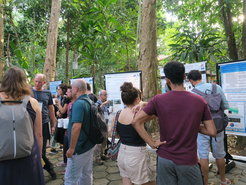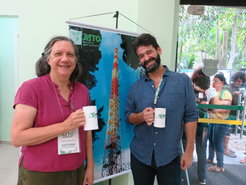ATTO Workshop in Manaus: Full steam ahead
As part of the German-Brazilian cooperation project Amazon Tall Tower Observatory (ATTO), international scientists are studying the Amazon rainforest and its interaction with the atmosphere and climate. The recent project workshop clearly confirmed that ATTO has developed into a research site with globally unique capabilities – despite the pandemic and challenging field conditions.

At the workshop in October, scientists from the ATTO project met in Manaus, Brazil, including many researchers from the Max Planck Institute for Biogeochemistry. It was the first in-person workshop since the start of the pandemic and many project members had met in person for the first time since early 2020. For this reason alone, the spirits were high.
For three days, the project's scientists exchanged information about their research. More than 70 participants were on site at the INPA campus in Manaus, others followed the workshop from Germany via livestream until late at night. As in 2019, many local students participated in the workshop and much of the time was devoted to the presentation of their results in poster sessions and intensive discussions, where new interactions across disciplines were explored. Each day began with plenary presentations on overarching themes. For example, one of the focal points was the upcoming CAFE Brasil campaign of the HALO research aircraft. Later on, interdisciplinary breakout sessions connected researchers from different working groups, to exchange ideas, to explore synergies and to strengthen future cooperation.

In addition to scientific discussions, other important topics were listed on the agenda, for example, increasing the availability of information for newcomers was given high priority. A further step will be to create a code of conduct for the work at ATTO. "The working conditions at ATTO are demanding. Many people of different cultures come together at the camp and they should arrive with a good understanding of the conditions they will experience and an understanding of how things operate day-to-day," Susan Trumbore explains. "We are very proud of ATTO’s record of safety and want to ensure an atmosphere of mutual respect as the project expands. Adding a code of conduct and clear information about camp conditions can help ensure psychological as well as physical well-being in the ATTO field environment. Our goal is to ensure that ATTO is a safe and supportive work space for the diversity of researchers who visit."
Another highlight was a visit from the group of teachers from the local communities near the ATTO site. Already in 2018, several early career scientists initiated collaboration with these communities, especially to support science education for the children living there. Due to the pandemic, this collaboration had paused for a few years, but activities resumed this year. In an overarching project together with local authorities, each school initiates recording of the level of the Uatumã River, thus producing local data that will be incorporated into state records. ATTO scientists now visit the schools almost monthly, for giving lessons and further developing interactive projects together with the students. By attending the workshop, the teachers gained further insights into research at ATTO and INPA, allowing them to plan upcoming collaborations.

Perhaps the most important message of the ATTO workshop, however, is that after more than two years of pandemic-related restrictions, we are now moving full steam ahead. This is made possible by the unwavering investigative spirit of the project members and by the financial backing of the project. After funding from the Max Plank Society and from the German Federal Ministry of Education and Research has already been extended last year, Beto Quesada was now able to announce excellent news about Brazilian funding. "We are extremely pleased to have received 8 million reals for ATTO from the Financiadora de Estudos e Projetos (FINEP-MCTI). We will use this to fund eight scientists for the next three years, among other things." In addition, six other projects funded by the Brazilian National Council for Science and Technology (CNPq) will start in a few weeks.
“This financial support will allow Brazilian researchers to operate with a more equal distribution of resources, ensuring strong scientific collaborations within the ATTO consortium in the coming years as we work together to unravel more mysteries of the Amazon”, Beto Quesada concludes.














